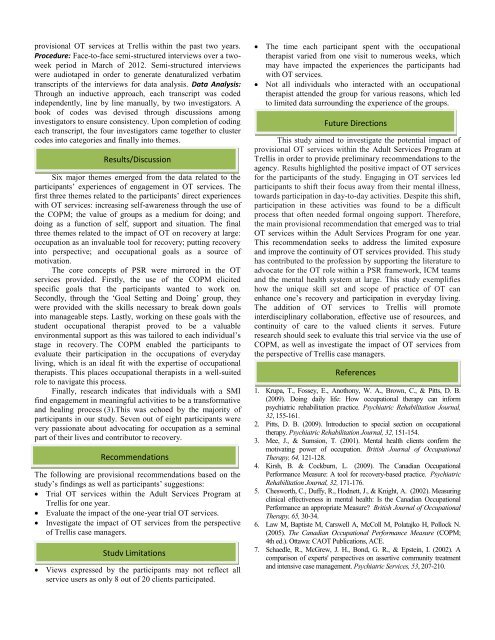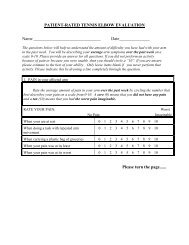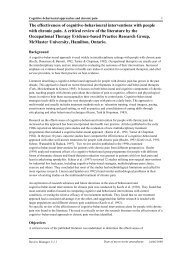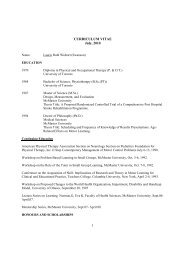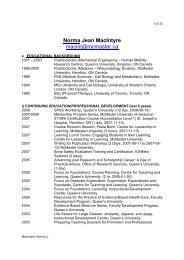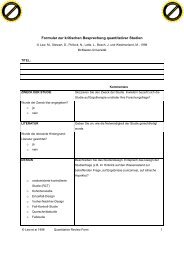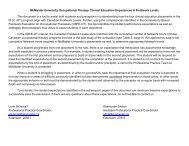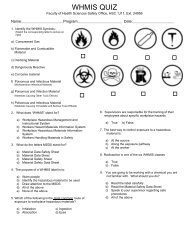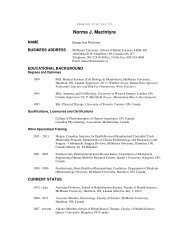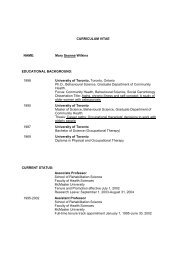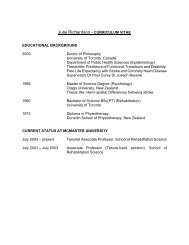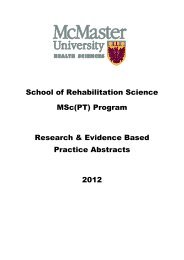Evidence Based Practice Symposium - McMaster University
Evidence Based Practice Symposium - McMaster University
Evidence Based Practice Symposium - McMaster University
Create successful ePaper yourself
Turn your PDF publications into a flip-book with our unique Google optimized e-Paper software.
provisional OT services at Trellis within the past two years.<br />
Procedure: Face-to-face semi-structured interviews over a twoweek<br />
period in March of 2012. Semi-structured interviews<br />
were audiotaped in order to generate denaturalized verbatim<br />
transcripts of the interviews for data analysis. Data Analysis:<br />
Through an inductive approach, each transcript was coded<br />
independently, line by line manually, by two investigators. A<br />
book of codes was devised through discussions among<br />
investigators to ensure consistency. Upon completion of coding<br />
each transcript, the four investigators came together to cluster<br />
codes into categories and finally into themes.<br />
Results/Discussion<br />
Six major themes emerged from the data related to the<br />
participants’ experiences of engagement in OT services. The<br />
first three themes related to the participants’ direct experiences<br />
with OT services: increasing self-awareness through the use of<br />
the COPM; the value of groups as a medium for doing; and<br />
doing as a function of self, support and situation. The final<br />
three themes related to the impact of OT on recovery at large:<br />
occupation as an invaluable tool for recovery; putting recovery<br />
into perspective; and occupational goals as a source of<br />
motivation.<br />
The core concepts of PSR were mirrored in the OT<br />
services provided. Firstly, the use of the COPM elicited<br />
specific goals that the participants wanted to work on.<br />
Secondly, through the ‘Goal Setting and Doing’ group, they<br />
were provided with the skills necessary to break down goals<br />
into manageable steps. Lastly, working on these goals with the<br />
student occupational therapist proved to be a valuable<br />
environmental support as this was tailored to each individual’s<br />
stage in recovery. The COPM enabled the participants to<br />
evaluate their participation in the occupations of everyday<br />
living, which is an ideal fit with the expertise of occupational<br />
therapists. This places occupational therapists in a well-suited<br />
role to navigate this process.<br />
Finally, research indicates that individuals with a SMI<br />
find engagement in meaningful activities to be a transformative<br />
and healing process (3).This was echoed by the majority of<br />
participants in our study. Seven out of eight participants were<br />
very passionate about advocating for occupation as a seminal<br />
part of their lives and contributor to recovery.<br />
Recommendations<br />
The following are provisional recommendations based on the<br />
study’s findings as well as participants’ suggestions:<br />
� Trial OT services within the Adult Services Program at<br />
Trellis for one year.<br />
� Evaluate the impact of the one-year trial OT services.<br />
� Investigate the impact of OT services from the perspective<br />
of Trellis case managers.<br />
Study Limitations<br />
� Views expressed by the participants may not reflect all<br />
service users as only 8 out of 20 clients participated.<br />
� The time each participant spent with the occupational<br />
therapist varied from one visit to numerous weeks, which<br />
may have impacted the experiences the participants had<br />
with OT services.<br />
� Not all individuals who interacted with an occupational<br />
therapist attended the group for various reasons, which led<br />
to limited data surrounding the experience of the groups.<br />
Future Directions<br />
This study aimed to investigate the potential impact of<br />
provisional OT services within the Adult Services Program at<br />
Trellis in order to provide preliminary recommendations to the<br />
agency. Results highlighted the positive impact of OT services<br />
for the participants of the study. Engaging in OT services led<br />
participants to shift their focus away from their mental illness,<br />
towards participation in day-to-day activities. Despite this shift,<br />
participation in these activities was found to be a difficult<br />
process that often needed formal ongoing support. Therefore,<br />
the main provisional recommendation that emerged was to trial<br />
OT services within the Adult Services Program for one year.<br />
This recommendation seeks to address the limited exposure<br />
and improve the continuity of OT services provided. This study<br />
has contributed to the profession by supporting the literature to<br />
advocate for the OT role within a PSR framework, ICM teams<br />
and the mental health system at large. This study exemplifies<br />
how the unique skill set and scope of practice of OT can<br />
enhance one’s recovery and participation in everyday living.<br />
The addition of OT services to Trellis will promote<br />
interdisciplinary collaboration, effective use of resources, and<br />
continuity of care to the valued clients it serves. Future<br />
research should seek to evaluate this trial service via the use of<br />
COPM, as well as investigate the impact of OT services from<br />
the perspective of Trellis case managers.<br />
References<br />
1. Krupa, T., Fossey, E., Anothony, W. A., Brown, C., & Pitts, D. B.<br />
(2009). Doing daily life: How occupational therapy can inform<br />
psychiatric rehabilitation practice. Psychiatric Rehabilitation Journal,<br />
32, 155-161.<br />
2. Pitts, D. B. (2009). Introduction to special section on occupational<br />
therapy. Psychiatric Rehabilitation Journal, 32, 151-154.<br />
3. Mee, J., & Sumsion, T. (2001). Mental health clients confirm the<br />
motivating power of occupation. British Journal of Occupational<br />
Therapy, 64, 121-128.<br />
4. Kirsh, B. & Cockburn, L. (2009). The Canadian Occupational<br />
Performance Measure: A tool for recovery-based practice. Psychiatric<br />
Rehabilitation Journal, 32, 171-176.<br />
5. Chesworth, C., Duffy, R., Hodnett, J., & Knight, A. (2002). Measuring<br />
clinical effectiveness in mental health: Is the Canadian Occupational<br />
Performance an appropriate Measure? British Journal of Occupational<br />
Therapy, 65, 30-34.<br />
6. Law M, Baptiste M, Carswell A, McColl M, Polatajko H, Pollock N.<br />
(2005). The Canadian Occupational Performance Measure (COPM;<br />
4th ed.). Ottawa: CAOT Publications, ACE.<br />
7. Schaedle, R., McGrew, J. H., Bond, G. R., & Epstein, I. (2002). A<br />
comparison of experts' perspectives on assertive community treatment<br />
and intensive case management. Psychiatric Services, 53, 207-210.


